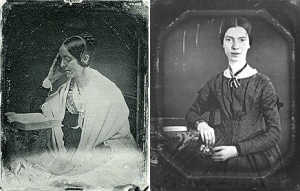They both speak to women’s inner identities. Despite the difference in time they both existed, Margaret Fuller, a renowned journalist and an advocate of women’s right and Emily Dickinson, an American poet both copes with the virtue of women’s right through their own ‘Master Letters’, which is juxtaposed by Judith Thurman in the article, “The ‘Master’ Letters of Margaret Fuller and Emily Dickinson”.
By parallelizing the letters by Fuller and Dickinson, Thurman conveys the sense that a commonly based idea can exist despite the difference in era in which each figures lived through. It’s true that Dickinson’s wordings expressed the sense of masochism while Fuller’s did not. For instance, Dickinson’s letters contained phrases such as “punish—don’t banish her—shut her in prison” and “Master, open your life wide and take me in forever” which came as a shock to a lot of readers who did not know about her beforehand. Instead of challenging herself with more adventures and rather eccentric experiences like Fuller did in her life, Dickinson tended to lock herself in her own space. Dickinson was more of a ‘reclusive spinster’. Thus, she was more surrounded by the suppression that was placed on women’s rights. Along with the social status by the time she lived, she was embedded with the societal aspect of oppressing the women’s equity and rights.
Fuller’s letter does seem to be less obsessed in possessiveness or in the sense of masochism; however, it does still yearn for belonging to the ‘Master’. For instance, Fuller uses phrases such as, “Thou wouldst forgive me, Master” and “Master!…Oh, if thou wouldst take me wholly to thyself”, which conveys Fuller’s affectionate toward the ‘Master,’ who is indicated as Beethoven in Thurman’s article. Therefore, it can be concluded that Thurman wanted to notify the readers that both Dickinson and Fuller expressed themselves while they also yearned for belonging to someone.
It was not only the complexly intertwined symbolic meanings of letters that Thurman wanted to convey but also the letter’s relevance to the present that provokes the readers to pay more attention to the correlation of writings and feminism she wanted to display. Though Fuller and Dickinson were well known for their advocacy of feminism, which is explicitly shown through either their journal or poems, they were still under pressure. Particularly, Dickinson she was a suppressed feminist who secluded herself in her home and wrote poetries that later marked a turning point in literature; Although she was reclusive, her emotions that boiled inside her inner identities and virtue was more severe and intense. Thus, she expresses a mental state of masochism. Similarly, Fuller also “yearned for surrender” even though she had published various writings that overtly displayed her assertion in women’s rights, she still desired for surrender and longing to give herself to someone else.
Such features relates to the current feminists that are prevalent in our daily lives. It’s true that there are a lot of people who openly convey their assertions on women’s rights publicly. Accordingly, a lot of countries already have Ministry of Gender Equality & Family (so does Korea), which was established basically to guarantee equality among genders so that discrimination that occurs due to the reason that one is female would no longer exist in the society. For instance, there are feminists such as Janeane Garofalo and Joseph Whedon who are currently expressing their ideas on feminism. On the other hand, there are a lot of people who does not publicly raise their voices on supporting feminism. While Fuller and Dickinson was under the oppression of the societal restraints, a majority of people who supports feminism in these days step backwards due to personal status or the matter of bravery.
Last year, after all of our classmates read an article that was based upon the idea of feminism, a group of students began to make remarks on the article by saying it was ‘biased’ and that it contained ‘feministic idea’. Yes, it did contain certain points; however, it was an expression of the author and there were certainly another group of students who respected and supported the author’s viewpoint on feminism; however, because the previous group made criticism on feminism, those who respected the idea defied to raise their voice and the contradict their points because they did not want to argue about it. In other words, because one made a criticism beforehand, the supporters refused to raise their voices due to the fear of being criticized. Though this experience may seem trivial, I believe that it surely exemplifies one of the reasons why people of these days are still under suppression on expressing their idea on feminism despite the fact the more freedom of speech is given in comparison to that of the past when Fuller or Dickinson lived.
If the suppression that Fuller and Dickinson underwent was the societal restrictions and atmosphere, there is another form of restraints that blocks a majority of feminists or those who respect feminism to overtly express their ideas. Though it may seem less significant to the actual social aspects that limited figures like Fuller and Dickinson, people in these days still face such difficulties in expressing their inner identities due to the fear of being ‘witch hunted’ despite the fact that more freedom of speeches is guaranteed.
Thurman clearly conveys the features of both Emily Dickinson and Margaret Fuller through the common example, the ‘Master’ Letter, and notifies the readers to relate it to our current status. Though it may seem trivial, people these days still face suppression that results in a conflict in individual’s inner identities.



